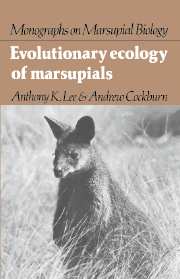Book contents
- Frontmatter
- Contents
- Preface
- 1 Introduction
- 2 Marsupials and their resources
- 3 The marsupial life history
- 4 Life histories of the carnivorous marsupials
- 5 Life histories of the herbivorous marsupials
- 6 Antechinus as a paradigm in evolutionary ecology
- 7 Coevolution and community structure
- 8 Future directions
- Appendix 1
- Appendix 2
- References
- Marsupial genus and species index
- Subject index
8 - Future directions
Published online by Cambridge University Press: 13 March 2010
- Frontmatter
- Contents
- Preface
- 1 Introduction
- 2 Marsupials and their resources
- 3 The marsupial life history
- 4 Life histories of the carnivorous marsupials
- 5 Life histories of the herbivorous marsupials
- 6 Antechinus as a paradigm in evolutionary ecology
- 7 Coevolution and community structure
- 8 Future directions
- Appendix 1
- Appendix 2
- References
- Marsupial genus and species index
- Subject index
Summary
From the foregoing analyses it should be obvious that there are still major deficiencies in our data base for marsupials. Although we would welcome any information, either published or unpublished, which helps to overcome these gaps, we believe the available data point to a number of important theoretical areas worthy of future investigation.
It is clear from Chapter 2 that it is important to distinguish between anecdotal observations on diet and those studies which carefully measure food intake, particularly in relation to food availability. Only a few studies have unequivocally demonstrated food preference by marsupials. In order to interpret the importance of particular food resources it will be necessary to attempt experimental manipulations of resources to determine which of them are limiting to particular populations.
In Chapter 3 we stress the need for increased recognition of allometric and developmental constraints on life history traits in marsupials. We also feel that it is important to consider traits of species in a holistic perspective rather than in terms of exigencies operating on individual species. Our data also point to the need for increasing synthesis of ecological, developmental and physiological approaches to marsupial biology. Specific areas worthy of further research identified in this chapter include the possibility of adaptive brood reduction in polytocous marsupials, measurement of the cost of lactation in eutherians versus marsupials, examination of the sources of the rapid pace of life found in the Peramelidae and interpretation of marsupial growth and development in terms of heterochrony.
In Chapter 4 we review the biology of three well-studied taxa of marsupials which feed predominantly on animal tissue.
- Type
- Chapter
- Information
- Evolutionary Ecology of Marsupials , pp. 222 - 223Publisher: Cambridge University PressPrint publication year: 1985

